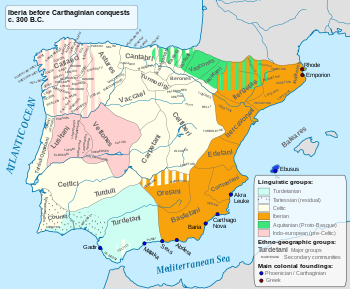

The Edetani were an ancient Iberian (Pre-Roman) people of the Iberian Peninsula (the Roman Hispania). They are believed to have spoken a form of the Iberian language.


The Edetani were an ancient Iberian (Pre-Roman) people of the Iberian Peninsula (the Roman Hispania). They are believed to have spoken a form of the Iberian language.
The Lusitanians were an Indo-European-speaking people living in the far west of the Iberian Peninsula, in present-day central Portugal and Extremadura and Castilla y Leon of Spain. After its conquest by the Romans, the land was subsequently incorporated as a Roman province named after them (Lusitania).

The Turduli Oppidani or Turdulorum Oppida, were a pre-Roman coastal people in present-day Portugal, related to the Turduli Veteres and akin to the Callaeci-Lusitanians.

The Bastetani or Bastuli were an ancient Iberian (pre-Roman) people of the Iberian Peninsula. They are believed to have spoken the Iberian language. The relationship between the Iberian Bastetani and the Tartessian Mastieni is not entirely clear.

The Ausetani were an ancient Iberian (pre-Roman) people of the Iberian Peninsula. They are believed to have spoken the Iberian language. They lived in the eponymous region of Ausona and gave their name to the Roman city of Ausa.

The Ilergetes were an ancient Iberian (Pre-Roman) people of the Iberian Peninsula who dwelt in the plains area of the rivers Segre and Cinca towards Iberus (Ebro) river, and in and around Ilerda/Iltrida, present-day Lleida/Lérida. They are believed to have spoken the Iberian language.

The Indigetes were an ancient Iberian (Pre-Roman) people of the eastern side of the Iberian Peninsula. They are believed to have spoken the Iberian language.

The Laietani were an ancient Iberian (Pre-Roman) people of the Iberian Peninsula. They inhabited the area occupied by the city of Barcelona. One of the main thoroughfares of the city, Via Laietana, is named after the Laietani. They are believed to have spoken an Iberian language.

The Cessetani were an ancient Iberian (Pre-Roman) people of the Iberian Peninsula. They are believed to have spoken the Iberian language. Their territory extended along the coast between the Coll de Balaguer and the Garraf Massif and was limited in the west by the Prades Mountains.

The Ilercavones were an ancient Iberian (Pre-Roman) people of the Iberian Peninsula. They are believed to have spoken an Iberian language.

The Oretani or Oretanii were a pre-Roman ancient Iberian people of the Iberian Peninsula, that lived in northeastern Andalusia, in the upper Baetis (Guadalquivir) river valley, eastern Marianus Mons, and the southern area of present-day La Mancha.

Contestani is an ethnonym of Roman Spain of the imperial period. It appears chiefly in the Greco-Roman writers Pliny the Elder, 1st century, and Claudius Ptolemy, 2nd century. Pliny might be considered the more creditable, as he was for a time procurator of the official Hispania Tarraconensis, a province of the Roman Empire encompassing all the north and all the east of the Iberian Peninsula.

The Lacetani were an ancient Iberian (pre-Roman) people of the Iberian Peninsula. They are believed to have spoken an Iberian language.

The Lobetani, were a small pre-Roman Iberian people of ancient Spain mentioned only once by Ptolemy in the 2nd century AD, situated around the mountainous Albarracín area of the southwest Province of Teruel.

The Germani were an obscure pre-Roman ancient people of the Iberian Peninsula which settled around the 4th century BC in western Oretania, an ancient region corresponding to the south of Ciudad Real and the eastern tip of Badajoz provinces.

The Belli, also designated Beli or Belaiscos were an ancient pre-Roman Celtic Celtiberian people who lived in the modern Spanish province of Zaragoza from the 3rd Century BC.

The Plentauri or Pleutauri was a small, pre-Roman mountain people of the Iberian Peninsula mentioned briefly by Strabo who placed them in the Ebro sources area close to the Cantabrian range, roughly corresponding today to northwestern La Rioja.

The Sedetani were an ancient Iberian (Pre-Roman) people of the Iberian Peninsula. They are believed to have spoken a form of the Iberian language.

The Castellani or 'Castelani' were an ancient Iberian or Pre-Roman people of the Iberian Peninsula. They inhabited the bottom of the eastern Pyrenees in the northern Tarraconense.

The Bergistani, were an ancient Iberian or Pre-Roman people of the Iberian Peninsula. They were related to the Ilergetes and were not numerous. They inhabited the valley of the Saiarra river in the upper course of the Llobregat in the northern Tarraconense.